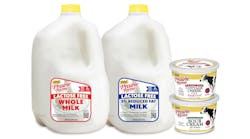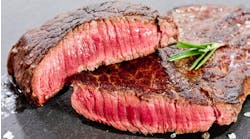Formulated white mineral oils fall into the FDA/USDA/NSF H1 category, indicating the lubricant is permitted for use where there is a possibility of incidental contact with food. Food-grade oils can act as an insurance policy in case of accidental contamination because they won’t ruin the food product; this is the best way to determine if you may need them in your operations.
There are different types of food-grade lubricants available on the market to meet any plant need. For example, food-grade greases must perform the same technical functions as oils but maintain a more viscous texture and have a more tolerant thermal breakdown threshold. Given the extreme environments food-grade oils must work in, food-grade greases are a critical component to maintaining properly working machinery and should be considered as part of the lubrication equation.
Possible contamination situations include production machinery where gear lubricant may leak from a lender agitator gearbox, hydraulic fluid leaking due to a ruptured hose or where chain lubricant on conveyor belts could mix with food products.
MRO Q&A is a monthly problem-solving column for maintenance, repair and operational issues. To pose a question for answering online click here.
